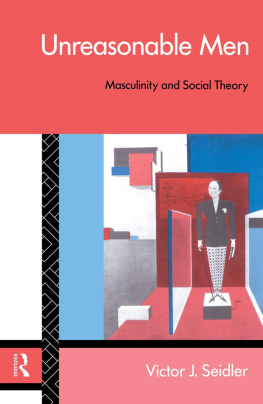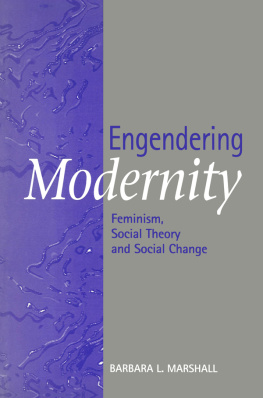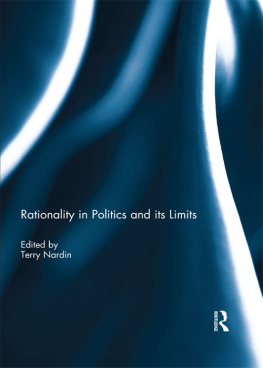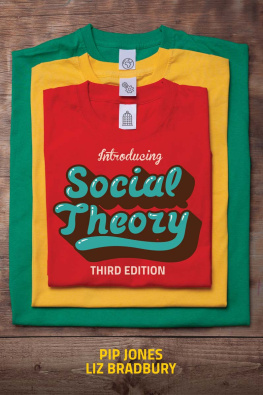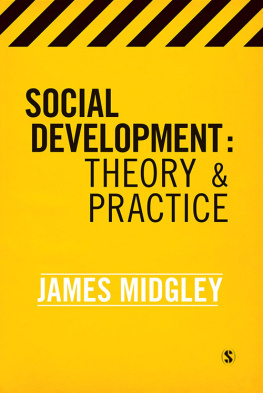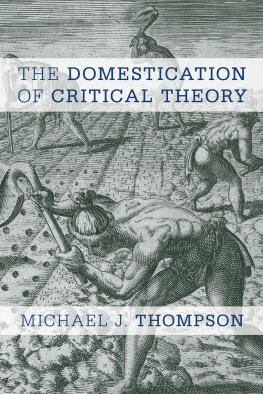Unreasonable men
Vic Seidler argues that the identification of masculinity with reason has played a central role in Western concepts of modernity and the forms of social theory and philosophy which have emerged. Reason is defined in opposition to emotions while the mind is set against the body and culture set against nature, as men have learnt to take their reason for granted. This produces an unreasonable form of reason that men learn to use to legislate for others, before learning to speak more personally for themselves. This is part of the power that men can assume in relation to women which is embodied in dominant forms of social theory. Emotions and feelings are discounted as forms of knowledge for they are deemed to be personal and subjective when contrasted with the objectivity and impartiality of reason. The dominant forms of social theory have worked with a universal and impersonal conception of reason which, forming our visions of language, morality and politics, have often discounted experience treating it as an effect of discourses alone.
The book demonstrates how an Enlightenment view of modernity operated to exclude and silence those who it regarded as others' for being closer to nature, thereby setting the terms in which others' have to prove themselves rational to enter the 'magic circle of humanity'. As reason is set against nature so progress is identified with the control and domination of nature. Traditions of social theory carry both the dreams and demons of a modernity which, blind to the issues of sexism, racism and anti-Semitism, could only recognize injustice and oppression as 'real and objective within the public world of men.
Victor Jeleniewski Seidler is Reader in Social Theory in the Department of Sociology at Goldsmiths' College, The University of London. He is the editor of The Achilles Heel Reader.
Male orders
Edited by Victor J. Seidler
Goldsmiths College, University of London
MALE ORDERS attempts to understand male forms of identity, practice and association in the modern world. The series explores how dominant forms of masculinity have helped shape prevailing forms of knowledge, culture and experience. Acknowledging the challenges of feminism and gay liberation, the series attempts a broad and critical exploration of men's lives as well as engaging constructively with malestream definitions of modernity and postmodernity.
Also in this series
Recreating Sexual Politics
Men, Feminism and Politics
Victor J. Seidler
The Achilles Heel Reader
Men, Sexual Politics and Socialism
Edited by Victor J. Seidler
Men, Sex and Relationships
Writings from
Achilles Heel Edited by Victor J. Seidler
Mens Silences
Predicaments in Masculinity
Jonathan Rutherford
Fathers and Daughters
Sue Sharpe
Dislocating Masculinities
Comparitive Ethnographies
Edited by Andrea Cornwall and Nancy Lindisfarne
Unreasonable men
Masculinity and social theory
Victor J. Seidler
First published 1994
by Routledge
Published 2013 by Routledge
2 Park Square, Milton Park, Abingdon, Oxon OX14 4RN
Simultaneously published in the USA and Canada
by Routledge
711 Third Avenue, New York, NY, 10017, USA
Routledge is an imprint of the Taylor & Francis Group, an informa business
1994 Victor J.Seidler
Typeset in Times by Michael Mepham, Frome, Somerset
All rights reserved. No part of this book may be reprinted or reproduced or utilised in any form or by any electronic, mechanical, or other means, now known or hereafter invented, including photocopying and recording, or in any information storage or retrieval system, without permission in writing from the publishers.
British Library Cataloguing in Publication Data
A catalogue record for this book is available from the British Library.
Library of Congress Cataloging in Publication Data
Seidler, Victor J., 1945
Unreasonable men/Victor J. Seidler.
p. cm. (Male orders)
Includes bibliographical references and index.
1. Masculinity (Psychology) 2. Men Psychology. 3. Reason. 4. Power (Social sciences) 5. Social sciences Philosophy.
I. Title. II. Series.
HQ1090. S45 1993
155.332dc20
933492
CIP
ISBN 13: 978-0-415-08294-5 (pbk)
With regard to human affairs, not to laugh, not to cry, not to become indignant, but to understand.
Spinoza
Reason has always existed, but not always in reasonable form.
Marx
One needs time to absorb an experience until he understands not only with his head, but with his heart.
Janusz Korczak
In Loving Memory of my stepfather Leo Seidler.
Contents
As men have been challenged by the theories and practices of feminism in the ways that we have grown up to think and feel in relationships, so we have also been encouraged to ask new questions of our prevailing traditions of philosophy and social theory. It has taken time to identify the ways our identities as men have been shaped by particular histories, cultures and traditions. We have become so accustomed to being able to talk on behalf of others and to legislate what would be for the best that we have rarely acknowledged how difficult it is for us to talk more personally. If anything, this reflects something personal or psychological rather than revealing anything more significant about the relationship of masculinity to modernity.
But within modernity shaped by the terms of the Enlightenment and the scientific revolutions of the seventeenth century, men have grown accustomed to take their reason and rationality for granted. Unlike our masculinity it is not anything that we have to constantly prove, for reason has been shaped within the image of the dominant form of masculinity. Francis Bacon could talk quite unashamedly about the new sciences as a masculinist philosophy. There was a crucial sense in which masculinity occupied a central space within modernity and in which reason and progress were to be tied with the control and domination of nature. Some of these identifications came to define the dominant forms of reason and rationality, so that to bring their historical and cultural formations into question would set you beyond the pale of reason. But we have gradually learned to listen to the dissident voices of Neitzsche, Freud and Wittgenstein who, each in their own way, have helped to question the terms of modernity. In their different ways they understood that we have to understand ourselves as children of modernity if we are to grasp how we remain trapped for good and for evil within its ways.
How we learn to evaluate the project of modernity and whether it has exhausted itself as we have moved into the postmodern that can only be grasped in radically different terms, has become a central question in social theory and philosophy. It crucially affects how we understand and treasure our inherited traditions, or whether we think they have to be put aside if we are to grasp the very different times in which we are living. I am wary of this tendency to ceaselessly search for new ground, since this has long been a central impulse within modernity. It is also characteristic of a particular form of restless masculinity. We are looking for an escape and are unable to detect the crisis of values that has intensified in the post-colonial and post-communist world. Often we confuse pluralism with relativism, as anything seems to go within the postmodern world. Supposedly we are to celebrate our fragmentation and discontinuity, for there is nothing beyond the realm of appearances. What we see is what we get, if we are to believe Baudrillard.

